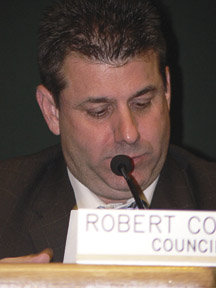Although the Town Council had been expected to take a final vote on the $45.5 million 2010 municipal budget on Tuesday, six months into the year, the governing body apparently won’t vote on the spending measure until the New Jersey Local Finance Board authorizes two measures in the budget that require state approval.
In June the council introduced the budget that included a 66-cent tax increase for every $1,000 of property owned. Since the town assesses the average Secaucus home at $165,000, the 66-cent increase means the average homeowner would pay about $108 more per year to support the municipal budget, which amounts to $27 per tax quarter.
This 66-cent increase is for the town’s tax rate only and is separate from the county and school taxes property owners also pay each quarter.
The governing body now expects to vote on the 2010 municipal budget at its meeting of August 24.
The council had to delay its vote because the state must approve the town’s plan to restructure $3.2 million worth of debt from the Secaucus Municipal Utilities Authority (SMUA), and must also sign off on required bonding for tax appeals.
“With this extra time we’re looking at various ways to further reduce that tax burden.” – Robert Costantino
________
“It’s a requirement that if you’re going to bond for local tax appeals, before you adopt a budget, you have to get approval from the state. It’s a perfunctory thing,” Drumeler said after Tuesday’s meeting. “The second issue is we’re restructuring some SMUA debt. So we have to present to the [state] what we plan to do.”
Drumeler added, “We thought the Local Finance Board would get to us at their last meeting, [held July 14]. But as it turned out, they had a very heavy agenda last month.”
The Finance Board approved the bond issue, but didn’t vote yet on the SMUA debt issue.
The administration of Mayor Michael Gonnelli, which took office in January, had hoped to adopt annual budgets earlier in the year than did his predecessor, Dennis Elwell. It is common for local towns to adopt their budgets late while they wait for aid numbers and revenue details, but this means that they have less flexibility once the plans are finally voted on, because a lot of money for the fiscal year has already been spent. Throughout the state, mayoral administrations pledge each year to finish the budget process early, but then fail to do so.
Under Elwell, the 2008 budget was approved in July, seven months into the fiscal year. The 2009 budget was adopted last September, two months after Elwell’s arrest on corruption charges.
Reducing size of tax increase
Members of the council said Tuesday that they are using the delay to make slight revisions to the budget – revisions that could result in a smaller tax increase.
“With this extra time we’re looking at various ways to further reduce that tax burden,” said Town Councilman Robert Costantino, chairman of the governing body’s Finance Committee. “We’re looking at some new revenue that will help that number come in a little bit lower.”
He added that the administration has uncovered about $4.8 million in special assessments that were never recovered. When a special assessment is done, the town improves property – typically streets and roads that are largely used by businesses rather than the general public – then bills the property owners for the work done. For several years, however, bills weren’t issued for such work, meaning the town paid labor and other costs for the work, but was never repaid.
Bills are now going out to property owners that benefitted from this work, which will bring in new revenue that could lower the 2010 tax rate.
The town has also raised $110,660 in outstanding fire alarm violations that had gone uncollected for several years.
$2.3M in missed grant opportunities
However, Costantino also pointed out Tuesday that the town has lost some $2.3 million in promised grant funding dating back to 2002 because it failed to submit required paperwork to obtain the grants.
Among the grants lost, Costantino said, were a:
• $375,000 grant to hire new police officers;
• $50,000 grant to hire police personnel for school buildings;
• $200,000 grant from the New Jersey Meadowlands Commission;
• $650,000 grant for turf for Kane Stadium, and a
• $880,000 green acres grant for Acorn Rd. and Farm Rd.
The work that these grants would have paid for was still completed – but ended up being paid for by local taxpayers.
“Because of the age of these grants, and the failure to submit proper documentation for these payments, the town most likely will not receive this funding,” Costantino said. “We’ve asked our new auditors to review and investigate what happened. We want to put in policies and procedures so that this never happens again.”
Public frustrated
During the public comments portion of the meeting, resident Pat Belenski asked whether any of the individuals who were responsible for tracking these grants are still employed with the town.
Mayor Gonnelli dodged the question, saying only that employees will be held “accountable” in the future and that systems will be put in place to prevent similar oversights again.
When pressed by the Reporter after the meeting, the mayor would only say that he holds the “previous administration” accountable for the loss of funding.
Former Town Administrator Anthony Iacono indicated on Wednesday that such paperwork should have been filed by Secaucus’ grants writer. Until this year, Tom Calvanico had a professional service contract worth $27,000 with the town to write grants on Secaucus’ behalf.
In one of its first official acts, the Gonnelli administration ended Calvanico’s contract in January.
E-mail E. Assata Wright at awright@hudsonreporter.com.
